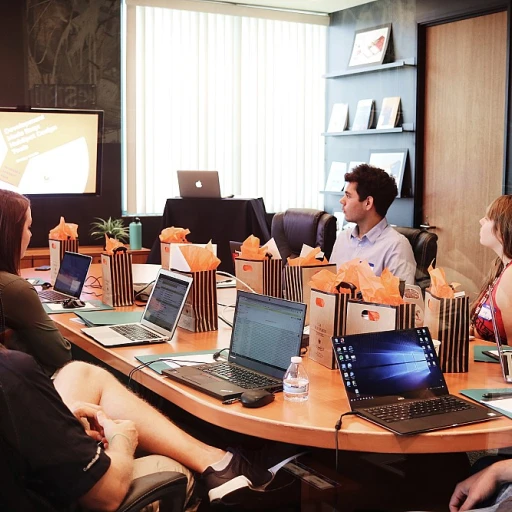
Understanding the Talent Coordinator's Role
Grasping the Essentials of Talent Coordinator's Responsibilities
In the dynamic realm of influencer agencies, a talent coordinator stands as a vital cog in the mechanism that aligns talent with brand objectives. This role is more than just a point of contact; it plays a crucial part in the broad spectrum of talent management.The primary responsibility of a talent coordinator is to facilitate smooth interactions between influencers and brands, ensuring that both parties meet their business goals effectively. They work as intermediaries, blending public relations expertise with marketing strategies to drive successful influencer marketing campaigns. Coordinating the schedules, content outputs, and promotional activities of these digital creators requires keen attention to detail and strategic planning.
One vital facet unknown to some is that talent coordinators must stay abreast of social media trends. The social media landscape is constantly evolving, and influencers often need to adjust their content strategies to stay aligned with these shifts. Therefore, familiarity with social media tools and digital marketing practices is indispensable for anyone in this position. By understanding these trends, coordinators can better serve both the creators and the marketing agencies.
In essence, the role of a talent coordinator is multifaceted, encompassing elements of talent management, marketing, and public relations. By establishing sturdy relationships with content creators and navigating the changing tides of social media, talent coordinators ensure that talent agencies operate at peak efficiency. To explore more about how passive leadership impacts talent management, check out Understanding the Impact of Passive Leadership in Talent Management.
Key Skills for Effective Talent Coordination
Essential Qualities for Success in Talent Coordination
In the fast-paced world of influencer marketing, talent coordinators play a pivotal role in connecting brands with the right content creators. To succeed, these professionals must possess a unique set of skills and qualities that are crucial in navigating the complexities of this dynamic industry.
Effective talent coordination requires a strategic mix of clear communication, organizational prowess, and keen intuition. Coordinators must seamlessly juggle various tasks, ensuring that campaigns run smoothly and that both influencers and brands achieve their objectives. Here are some key skills vital to effective talent coordination:
- Strong Communication: Talent coordinators must communicate clearly and effectively with creators, talent agents, and brands. This ensures all parties are aligned and can work collaboratively to meet campaign goals.
- Attention to Detail: Coordinators need to track multiple aspects of influencer collaborations, from deadlines to deliverables. Attention to detail is critical to avoid missteps and maintain project quality.
- Negotiation Skills: A crucial aspect of a talent coordinator's role involves negotiating terms that are favorable for both influencers and brands, ensuring a win-win situation for all involved.
- Adaptability: In an industry driven by social media trends and constant change, being adaptable allows coordinators to pivot strategies and embrace new opportunities as they arise.
- Relationship Building: Understanding the intricacies of building strong relationships with creators and influencers fosters trust and longevity in partnerships.
Additionally, talent coordinators should stay informed about emerging industry trends and the evolving landscape of digital marketing. This knowledge enables them to adapt their strategies and leverage new tools and platforms, enhancing their effectiveness in talent management. As the industry grows and evolves, these skills become increasingly essential for talent coordinators seeking to make a significant impact in influencer agencies.
For more insights into the talents and skills required for successful coordination, you may want to explore the differences and nuances within the talent management field.
Challenges Faced by Talent Coordinators
Overcoming Hurdles in Influencer Coordination
The role of a talent coordinator in influencer agencies can be both rewarding and challenging. As the digital marketing landscape evolves, these coordinators find themselves navigating a dynamic environment where they must balance several responsibilities. Here are some of the challenges they frequently face:- Ever-Changing Social Media Trends: Keeping up with the latest social media trends is critical for a talent coordinator. With platforms constantly introducing new features and algorithms, coordinators must stay informed to effectively engage and align with influencers who are constantly adapting their content strategies.
- Managing Diverse Talent Pools: In the influencer industry, coordinators often manage a wide array of talent, each with their unique styles, audiences, and expectations. This diversity requires adept skills in talent management and personalized approaches to cater to varying needs and preferences, balancing the agency’s goals with influencers' brand objectives.
- Coping with Increasing Demands: The demand for influencers has skyrocketed as brands recognize the power of influencer marketing. This surge places additional pressure on talent coordinators to discover and onboard new talent quickly and efficiently while ensuring quality and brand alignment are not compromised.
- Technological Integration: Utilizing digital tools for content and talent management is essential but can be a hurdle without proper training. Coordinators need to be proficient in digital marketing strategies and platforms to streamline processes and improve their unlocking the potential of HubSpot consultants in talent management.
- Balancing Public Relations and Business Goals: Talent coordinators often play a crucial role in maintaining an agency’s reputation. They must navigate the delicate balance between fostering public relations and achieving business objectives, ensuring that partnerships and collaborations reflect well on the agency, its influencers, and associated brands.
The Impact of Social Media Trends on Talent Coordination
Shaping Talent Coordination Through Evolving Social Media Dynamics
The rapidly shifting landscape of social media profoundly impacts how talent coordinators operate within influencer agencies. Coordinators must stay ahead of the curve in digital marketing strategies, influencer marketing trends, and content creation tactics. Their roles are increasingly centered around leveraging these changes to benefit both the agency and the talent they represent. In recent years, platforms like Instagram, TikTok, and YouTube have dominated the influencer marketing industry. Talent coordinators need to be adept at understanding how these mediums affect consumer behavior. This knowledge allows them to align their strategies with current social media trends, maximizing engagement and brand recognition for the influencers they manage. However, the impact isn't solely about adapting to popular platforms. Coordinators also navigate the complexities of algorithm changes and platform policy updates. These changes can have substantial effects on talent management strategies, directly influencing visibility and reach. Staying informed helps talent coordinators provide relevant and timely guidance to the influencers they serve, ensuring that they can maintain a competitive edge. Another aspect is the rise of video content. With platforms like TikTok driving the shift toward short-form video, coordinators must strategize content production that resonates with target audiences while maintaining the brand's voice. Creators and influencers are at the forefront of these trends, necessitating strong relationships between coordinators, influencers, and brands. The rise of social commerce—where audiences can purchase directly from social media platforms—also presents new opportunities and challenges. Coordinators must adeptly integrate these features in marketing campaigns to drive influencer engagement and business results. Overall, social media trends continuously reshape the role of a talent coordinator. Balancing innovation with the core objectives of talent management, while keeping abreast of emerging platforms and consumer behaviors, is central to their ongoing success in the industry.Building Strong Relationships with Creators and Influencers
Fostering Collaborations between Brands and Creators
Building strong relationships with creators and influencers stands at the heart of effective talent management within influencer agencies. It's a crucial role where communication and collaboration fuel successful partnerships. But what does it take to master this intricate dance between brands and social media figures? Creating robust partnerships begins with understanding the unique value each creator brings to the table. Talent coordinators are tasked with the challenge of identifying influencers whose vision aligns with the brand's image. This requires a keen eye for talent and a deep understanding of both the creators' capabilities and the brands' marketing aspirations.- Open Communication: Maintaining open channels of communication is essential. It's important for coordinators to set clear expectations with both the brand and the influencer from the start. This transparency helps in building trust, ensuring all parties are aligned in terms of objectives and deliverables.
- Creative Freedom: While brands often have specific goals, allowing content creators some level of creative freedom can yield authentic and engaging content. Coordinators act as mediators, ensuring that creators feel empowered while ensuring brand guidelines are respected.
- Long-term Relationships: Unlike traditional business transactions, influencer marketing thrives on long-term collaborations. Coordinators aim to nurture these relationships, building a sense of loyalty and partnership that often results in more impactful campaigns. This requires consistency and reliability from the management coordinator, enhancing the influencer's advocacy for the brand over time.
- Feedback and Support: Providing feedback constructively and offering support aligns with modern management practices. By regularly touching base with creators and offering insights or adjustments, coordinators can ensure campaign effectiveness while keeping the creators inspired and motivated.













